Making Informed Decisions When Purchasing an Insurance Policy
In today’s ever-changing world, it’s crucial to plan for the future and ensure the well-being of our loved ones. At Golden Haven, we understand the importance of comprehensive preparations beyond insurance coverage. Our goal is to provide you with valuable insights and guidance on planning for the future. Whether it’s safeguarding your home, automobile, health, or valuable possessions, purchasing an insurance policy can provide peace of mind and financial security. This comprehensive guide will walk you through the essential aspects of purchasing an insurance policy, ensuring you make informed decisions.
1. Understanding the Importance of Insurance

Insurance acts as a financial safety net, providing protection against unforeseen circumstances. It offers peace of mind, knowing that you have a safety net to rely on in case of emergencies. Purchasing an insurance policy allows you to mitigate risks and transfer potential financial burdens to the insurance provider.
2. Assessing Your Insurance Needs
Before purchasing an insurance policy, it’s essential to assess your insurance needs carefully. Consider the assets you want to protect, such as your home, vehicle, health, or business. Evaluate potential risks and liabilities associated with these assets to determine the coverage you require. Conduct a thorough analysis of your current situation and future goals to make an informed decision.
3. Researching Insurance Providers

Choosing the right insurance provider is paramount to ensure reliable coverage and exceptional service. Take the time to research reputable insurance companies in your area. Look for providers with a strong financial standing, excellent customer reviews, and a wide range of insurance options. Check if the company specializes in the type of insurance you need and compare their reputation and track record in the industry.
4. Comparing Insurance Policies
Once you have shortlisted potential insurance providers, it’s time to compare the policies they offer. Examine the coverage details, exclusions, and limitations of each policy. Pay attention to the fine print and ensure that the policy aligns with your specific needs. Consider factors such as deductibles, claim settlement process, and additional benefits. By comparing policies, you can choose the one that offers the best value for your money.
5. Understanding Insurance Terminology
Insurance policies can be complex, and filled with industry-specific jargon. It’s crucial to understand key insurance terminology to make informed decisions. Familiarize yourself with terms like premium, deductible, coverage limits, exclusions, and endorsements. Consulting with an insurance agent or referring to reliable online resources can help you gain a better understanding of these terms.
6. Evaluating Coverage Limits

Coverage limits refer to the maximum amount an insurance policy will pay for a covered claim. When purchasing insurance, carefully evaluate the coverage limits offered. Ensure they are adequate to protect your assets and liabilities. For example, when buying homeowner’s insurance, consider the replacement cost of your home and its contents to determine appropriate coverage limits.
7. Determining Deductibles and Premiums
Deductibles and premiums are crucial aspects of an insurance policy. A deductible is the amount you must pay out of pocket before the insurance coverage kicks in. Premiums, on the other hand, are the regular payments you make to maintain the insurance policy. Evaluate your financial situation and risk tolerance to determine the deductible and premium that suits your needs. Remember, a higher deductible often results in lower premiums.
8. Navigating the Claims Process

Understanding the claims process is vital in case you need to file a claim in the future. Familiarize yourself with the necessary steps to take when filing a claim with your insurance provider. Keep all relevant documents, such as receipts, photographs, and incident reports, organized and easily accessible. Promptly report any incidents to your insurance company and follow their instructions for a smooth claims process.
Since life insurance calculations typically do not account for inflation, it is wise to explore additional avenues to secure your financial future. One option is to invest in tangible properties that appreciate in value over time. Consequently, by acquiring assets that have the potential to grow, you can safeguard your financial stability against the erosive effects of inflation.
Another prudent approach is to consider securing a memorial property as a pre-need arrangement. By doing so, you can proactively lock in the current price and protect yourself from future price increases. Furthermore, this strategic decision ensures that you and your loved ones can have a dignified and meaningful resting place without having to bear the burden of potential rising costs. Moreover, by exploring these alternatives alongside life insurance, you can fortify your financial planning and create a more comprehensive and resilient strategy for the future.






















